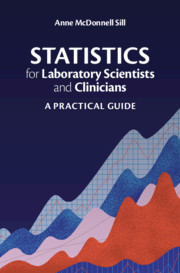Book contents
- Statistics for Laboratory Scientists and Clinicians
- Statistics for Laboratory Scientists and Clinicians
- Copyright page
- Contents
- Preface
- Acknowledgments
- I Basic Statistical Concepts
- 1 Understanding Some Basic Statistical Concepts
- 2 Types of Data and their Distributions
- 3 Significance Testing
- II The Right Statistical Test for Different Types of Data
- III Applied Statistics
- Glossary
- Figure Credits
- Index
3 - Significance Testing
from I - Basic Statistical Concepts
Published online by Cambridge University Press: 17 June 2021
- Statistics for Laboratory Scientists and Clinicians
- Statistics for Laboratory Scientists and Clinicians
- Copyright page
- Contents
- Preface
- Acknowledgments
- I Basic Statistical Concepts
- 1 Understanding Some Basic Statistical Concepts
- 2 Types of Data and their Distributions
- 3 Significance Testing
- II The Right Statistical Test for Different Types of Data
- III Applied Statistics
- Glossary
- Figure Credits
- Index
Summary
Scientists are a curious breed. They seek knowledge to advance science to improve health and innovate novel therapies and techniques. Most scientists will develop hypotheses and gather evidence to support or refute their scientific suspicions or hypotheses. Therefore, analysis of the data should be intentional and directed at the research question in hand.
Information
- Type
- Chapter
- Information
- Statistics for Laboratory Scientists and CliniciansA Practical Guide, pp. 30 - 58Publisher: Cambridge University PressPrint publication year: 2021
